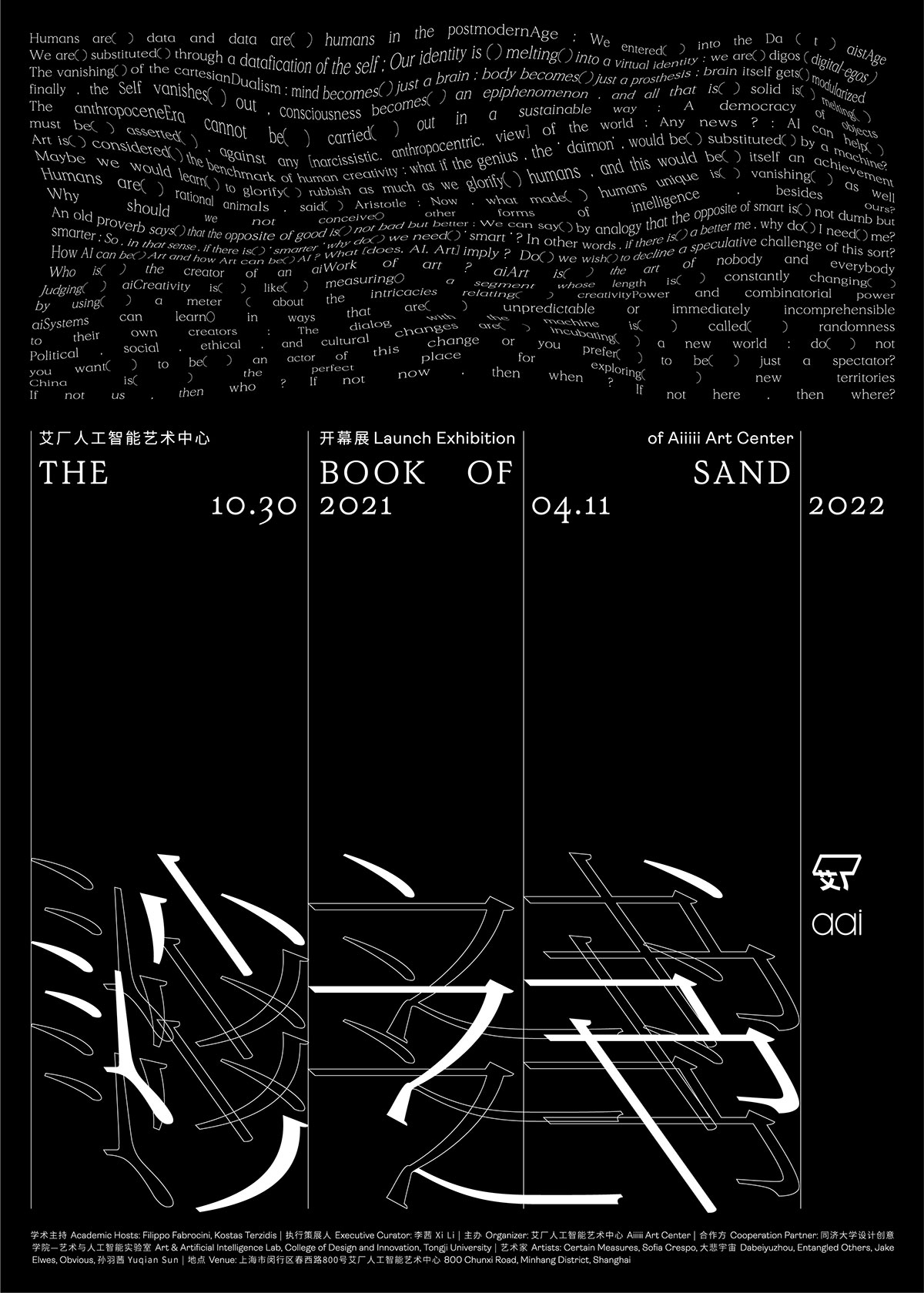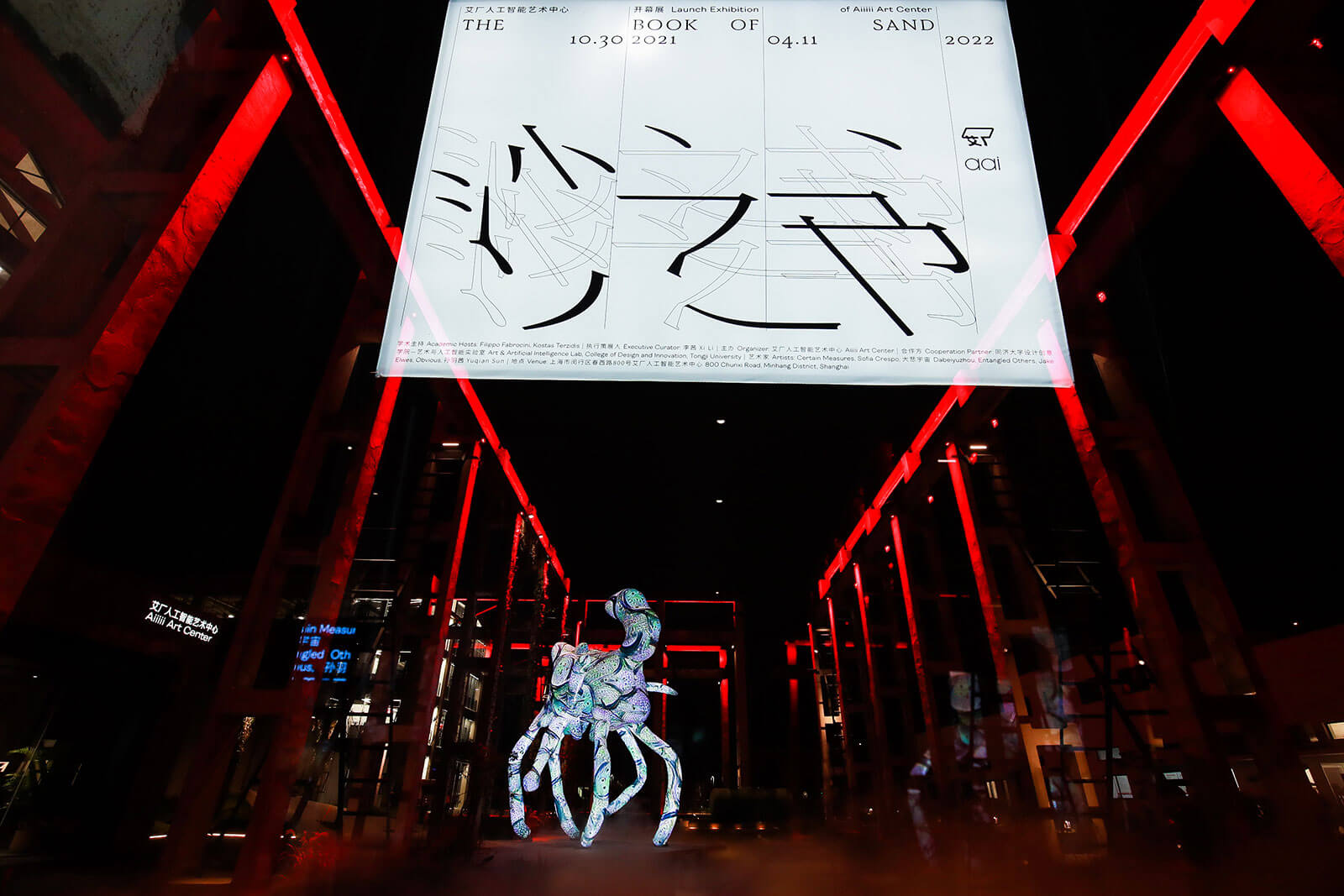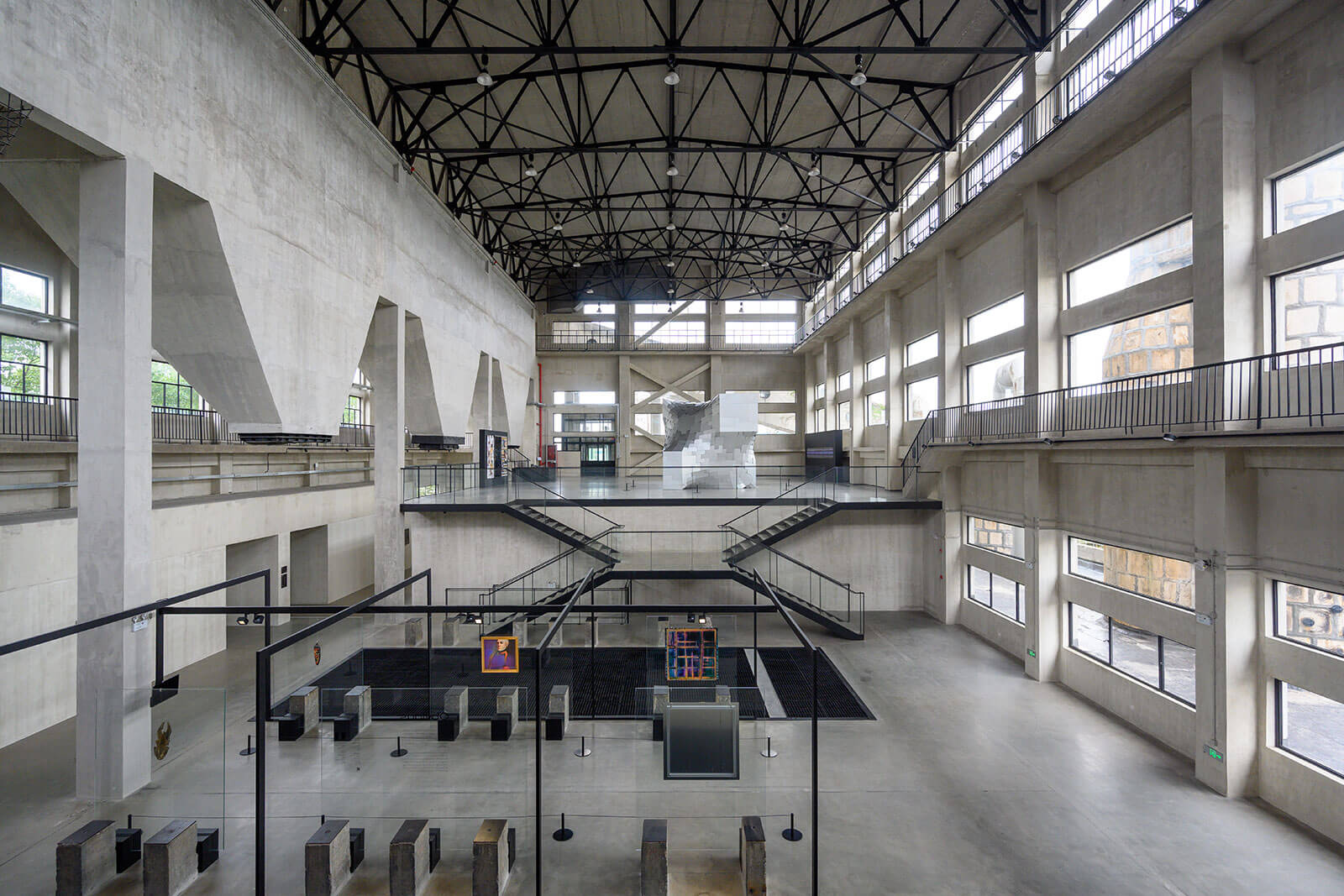


Exhibition Intro
Organised by: Aiiiii Art Center
Cooperation Partner: Art & Artificial Intelligence Lab, College of Design and Innovation, Tongji University
Dates: 30th October 2021-11 April 2022
Opening: 29th October 2021
Artists: Certain Measures, Sofia Crespo,Dabeiyuzhou, Jake Elwes, Entangled Others, Obvious, Yuqian Sun
Academic Hosts: Filippo Fabrocini, Kostas Terzidis
Executive Curator: Xi Li
Address: 800 Chunxi Road, Minhang District, Shanghai
Aiiiii Art Center is pleased to present its inaugural exhibition "The Book of Sand", opening on October 30, 2021. The exhibition will feature works from Certain Measures, Dabeiyuzhou, Entangled Others, Jake Elwes, Obvious, Sofia Crespo, and Yuqian Sun. The exhibition will run until April 11, 2022.
Aiiiii Art Center will structure its future practice around annual research topics. "The Book of Sand", as the opening exhibition of Aiiiii, will take “What is the author?” (the theme of the “2021 International Conference on AI and Art” held at Tongji University on 20-21 May 2021) as its first research topic. The core direction of this exhibition will be guided by our institutional manifesto, "Da(t)aism: A git-festo about AI and Art”, which will be combined with a series of AI Art workshops, forming the basis of the launch of the Aiiiii annual project from May 2021 to April 2022.
“Lines consist of an infinite number of points; planes an infinite number of lines; volumes an infinite number of planes, hypervolumes an infinite number of volumes... No, this, this more geometrico, is definitely not the best way to begin my tale.”
“The picture of an infinite line came to me, and I drew it: the line went on forever, right up to the edge of the universe. That is how the universe was born.”
The two sentences above are a way to begin our tale, as well as an “imitation game” that might eventually displace personal intellectual enjoyment — we presuppose that the text has been written by a human, but in fact, the first sentence is extracted from “The Book of Sand” written by the Argentine writer Jorge Luis Borges in 1975, whereas the second was generated today by a GPT-2 language model based on the first sentence. In 1950, Alan Turing, who is widely considered to be the father of artificial intelligence, proposed the "imitation game" (i.e., the famous Turing test) in his groundbreaking paper titled “Computing Machinery and Intelligence”. Turing asserted that within 50 years we would be able to program a computer with up to a billion bits of information, mimicking human behavior so accurately that after multiple five-minute testing sessions, more than thirty percent of human interrogators would be unsure whether they were talking to a human or a machine. The machine would then be recognized to have passed the Turing Test and therefore be considered to have an intelligence comparable to that of humans. Today, as we get closer to realizing Turing’s assertion, the question that Turing alluded to in 1950 resonates again: “Can machines think”?
The exhibition starts by employing literary imagination to juxtapose seemingly infinite, random generative art, and Borges' “Book of Sand”, a book that possess neither a beginning or an end, just like sand. A book in which “I”, the subject, can turn the pages but cannot predict the outcome, just as we cannot fully comprehend the operational logic of the “black box” embedded by and into a neural network. Against the joy of possessing the book grows the fear that the book is not really infinite, just as we fear that the infinite productivity of AI will make us its captives, as well as the fear that its “infinite creativity” is simply the outcome of smart permutations of existing human ideas. In “The Book of Sand”, Borges depicts an artificial intelligence-like non-technological medium, a book that could generate anything, that maps the kernel of posthumanism, a posthumanism without technology, where the human subject is finally challenged by “new models of subjectivity” (Katherine Hayles) that emerge from our non-human counterparts.
Going back to the question “can machines think?”, Turing proposed that the answer will depend on what a "machine" is and what "thinking" is. Are humans the only beings that are capable of thinking or creating? Do machines have subjectivity? Is subjectivity a requisite for thinking or creating? This appears to be an attempt to subvert and transcend the traditional anthropocentric paradigm correlated to notions such as “genius”, “creativity”, and “autonomy”. Through the ages, human perceptions of “thinking” have been closely associated with intellectual activities that imply an intention, which seems to be measured through the actions regardless of whether they are human-based or not. In this sense, can machines also be considered to have “intention”? Nevertheless, since intention is objectified by humans, a question as “can machines think?” opens a scenario in which the main concern lies in the power mechanism between humans and our non-human counterparts: is the artist in control of the machine, or is the machine in control of the artist?
“The Book of Sand” is an exhibition done by the joint efforts of machines and humans — the output of the machines interferes with human curatorial and artistic practices as soon asx we employ machine translation and language models.The exhibition hopes to build a poetic imaginary space through an enigmatic and fleeting constellation of AI artworks. As soon as the audience enters Aiiiii Art Center, a former power plant, they instantly become variables destined to influence the output through their interaction with the exhibition space. Centering around the non-anthropocentric idea of the “democracy of objects" (Levi Bryant), in which rubbish is as important as human beings, the artists will show a variety of artworks generated using different AI techniques, with the goal of exhibiting contemporary changes in the means of artistic production, as well as opening up a debate about issues related to the ethical, social, and philosophical implications of artificial intelligence. Meanwhile, we hope that through the displacement of notions such as “autonomy” and “creativity”, through the incarnation of the creator into the artificial, and through the disintegration of human subjectivity itself, our audience will come to ponder the true expanse of “thinking” and “intelligence”, and also be able grasp the very meaning of “creation” as conveyed by the insights of a non-human creator.
...between 0 and 1 lies an infinite number of values, images a finite number of pixels... No, this concept of machine language is definitely not the best way to begin the tale.
“Look carefully, you will never see it again.”
References:
Alan Turing, "Computing Machinery and Intelligence", Mind, Volume LIX, Issue 236, 1950.
Filippo Fabrocini, Kostas Terzidis, Re-framing AI: An AI Product Designer Perspective (to be published in “Techne’: Journal of Research and Technology”).
Jorge Luis Borges, “The Book of Sand,” (New York: Dutton, 1977).
Levi R. Bryant, The Democracy of Objects, (Ann Arbor: University of Michigan Library, 2011).
N. Katherine Hayles, How We Became Posthuman: Virtual Bodies in Cybernetics, Literature and Informatics,(Chicago: University of Chicago Press, 1999).
Academic Host
Kostas Terzidis
PhD, Professor, College of Design and Innovation, Tongji University Kostas Terzidis is professor at D&I at Tongji University and director of the ShangXiang Lab. He was previously associate professor at Harvard University GSD (2003-2011) and assistant professor at the UCLA (1995-2003). He holds a PhD from the University of Michigan, Masters from OSU, and diploma from Aristotle University. His research is automated design and AI. He is author of numerous academic papers and the sole author of four books: Permutation Design (Routledge: 2014), Algorithms for Visual Design (Wiley: 2009), Algorithmic Architecture (Architectural Press: 2006), and Expressive Form(Spon:2003). Between 2011-2017 he created and ran a startup called Organic Parking, Inc.
Filippo Fabrocini
PhD, Professor, College of Design & Innovation, Tongji University Prof. Filippo Fabrocini is Professor in the College of Design & Innovation and Director of the “Sustainable AI Lab”. His main areas of interest are Machine Learning and Ethical AI. Previously he has been Senior Researcher at IBM Research(Rome, Italy/San Jose, USA), Visiting Researcher in the School of Computer Science at Carnegie Mellon University(Pittsburgh, USA), Professor in the Dep. of Philosophy at Gregorian University, and General Manager of the IBM Milan/Rome Business Innovation Center (IBM BIC). Prof. Fabrocini has won multiple awards including two IBM Outstanding Technology Awards. He is the author of more than 30 papers and three books.